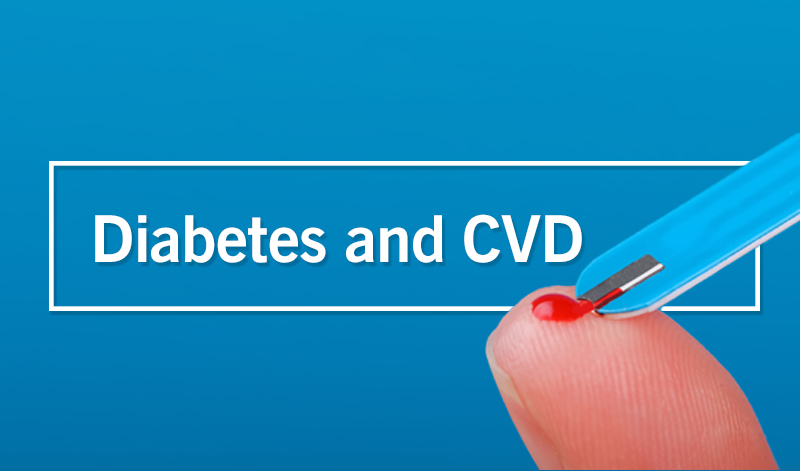Diabetes and CVD

Welcome to this modular e-learning programme looking at the treatment of diabetes in patients with cardiovascular disease (CVD).
CVD is a common cause of morbidity and mortality in people with diabetes. It is also recognised that patients with established CVD have a high prevalence of undiagnosed diabetes, and up to one third will have prediabetic states. Atherosclerotic events are reducing in people with diabetes as a consequence of the widespread use of statins and antihypertensive medications, and heart failure is now the most common first presenting cardiovascular condition in people with type 2 diabetes.
Older therapies for type 2 diabetes have shown disappointing results with regards to effects on cardiovascular outcomes. There are now three major new groups of drugs to treat people with diabetes: DPP-4 inhibitors, GLP-1 receptor agonists, and SGLT2 inhibitors. Many of these drugs have been studied in cardiovascular outcome trials, and several GLP-1 receptor agonists and SGLT2 inhibitors have been proven to reduce cardiovascular and renal events. Further trials have been performed with SGLT2 inhibitors in patients with heart failure and patients with chronic kidney disease and have demonstrated benefits in these populations.
This modular programme is primarily intended for non-diabetes practitioners but will also serve as a guide for trainees and others grades within the diabetes community. It is intended to explain the complexities of diabetes management in a digestible format.
In this modular programme, we will first be introduced in Module 1 to the epidemiology of diabetes and its cardiovascular consequences. Module 2 will discuss the clinical pharmacology of currently available anti-diabetes therapies and practical considerations for prescribing, including in populations with cardiovascular or renal disease. Module 3 will describe the cardiovascular outcome trials with the incretin-based therapies which are the DPP-4 inhibitors and GLP-1 receptor agonists. Module 4 will summarise the outcome trials of SGLT2 inhibitors in patients with diabetes, chronic kidney disease, and heart failure.
Each module will have a series of multiple-choice questions. Its 5 hours of learning will lead to 5 continuing professional development (CPD) credits
Novo Nordisk have provided sponsorship to support the development of this e-learning programme. Novo Nordisk have had no input into the content of this programme.
Contributors
Professor Miles Fisher, Honorary Professor, University of Glasgow, Glasgow
Dr Andrea Llano, Consultant Physician and Clinical Pharmacologist, Glasgow Royal Infirmary, Glasgow
Professor Gerard McKay, Consultant Physician and Clinical Pharmacologist, Glasgow Royal Infirmary, Glasgow
Diabetes and CVD module 1: epidemiology
Released 10 February 2021 Programme: Diabetes and CVD 1 CPD/CME credit

- Prevalence and risk factors for developing type 2 diabetes
- Diagnostic criteria for type 2 diabetes including the use of HbA1c
- Pathogenesis of type 2 diabetes
- Role of type 2 diabetes along with co-morbidities in defining an individual’s cardiovascular risk
- The evidence for treating to glycaemic targets
- Problem of heart failure in type 2 diabetes
- Rationale for cardiovascular outcome trials (CVOTs) and approaches to modern management in type 2 diabetes
Diabetes and CVD module 2: clinical pharmacology of anti-diabetes drugs
Released 10 February 2021 Programme: Diabetes and CVD 2 CPD/CME credits

- Outline the mechanism of action, dose and side effects for each of the main classes of anti-diabetic drugs
- Outline the rationale for use or contra-indications of these drugs in patients with cardiovascular disease (more details will be given in modules 3 and 4).
- Discuss the use of each class of drugs in patients with chronic kidney disease
Diabetes and CVD module 3: incretin-based therapies
Released 10 February 2021 Programme: Diabetes and CVD 1 CPD/CME credit

- Review the results of cardiovascular outcome trials (CVOTs) with DPP-4 inhibitors
- Review the results of key CVOTs with GLP-1 receptor agonists including LEADER, SUSTAIN-6, and REWIND
- Compare results with SGLT2 inhibitor CVOTs
- Define patients who would benefit from treatment with GLP-1 receptor agonists
Diabetes and CVD module 4: the role of SGLT2 inhibitors
Released 10 February 2021 Programme: Diabetes and CVD 1 CPD/CME credit

- Review the results of cardiovascular outcome trials (CVOTs) with SGLT2 inhibitors in people with diabetes, including EMPA-REG OUTCOME, CANVAS and DECLARE-TIMI 58
- Asses the results of trials of SGLT2 inhibitors in patients with renal disease, including CREDENCE and DAPA-CKD
- Asses the results of trials of SGLT2 inhibitors in patients with heart failure, including DAPA-HF and EMPEROR-Reduced
- Define patients who would benefit from treatment with SGLT2 inhibitors
